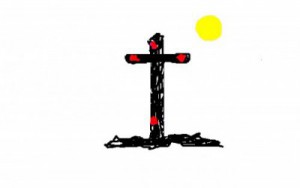“All the world’s a stage, and all the men and women merely players;” -William Shakespeare
A Story
With production nearing its final stages, the director gathers all the actors and crew together to review his final checklist. Surrounding him are men and women, in costume, ready to perform. With script in hand, he barks out commands and shouts questions, ensuring all the players know their lines and everything is in its proper place.
At one point, the director claps his hands and shouts into his megaphone, “I need to see all the soldiers first. Come on, all you Roman soldiers gather around.” Several men, wearing helmets and breastplates, with swords and spears in hand, circle around the director. “Okay, men. We’ve already been over the scene where you arrest Jesus, but I want to finalize a couple of the other scenes. So, when Jesus is in custody, awaiting trial, what are you men doing?”
One of the soldiers speaks up. “We’re to give him a beating.” Some of the men laugh, but quickly silence themselves when they receive the director’s angry glare.
Temporarily chastened, the soldiers stand around and wait, while the director flips through his script, reading the minute details, and then says, “Yes, that’s the gist of it. You give him a beating, but that’s not all. It says right here you’re to mock him, spit on him, strike him in the face…” He pauses as he reads further. “And it also says you’re to pluck out his beard.” Moans are heard coming from the soldiers. The director shakes his head and thinks, Pluck out his beard. That’s rough. He refers back to the script and continues, “Oh, hold on. Before you do all that, you must first scourge him.”
One of the soldiers says, “What’s a scourge?”
The director says, “You know, one of those whips with bits of stone embedded in the tips. It’s designed so that when you whip him with it, the sharp pieces rip his skin as each stroke of the whip is retrieved. The script says that his appearance must be marred. Can you gentlemen make sure his appearance is marred?”
In unison, all the men cry out, “Yes, sir!”
The director continues, “Okay I think we’ve got that down. So, the next scene is when he’s on the cross. Do we have a cross?” Someone in the back affirms there is a cross. The director reads more of the script. “It says here, he’s to be with criminals in his death. Do we have any criminals scheduled for crucifixion?”
One of his assistants says, “Yes, sir. There are two criminals scheduled for death on the same day.”
“Perfect! Okay then, we’ll have the two criminals hanging on either side of him. That will make a nice shot as the sun goes down in the background. Now, there’s one last scene for you men. When Jesus hangs on the cross, there are several things you must do. First, after hanging in the hot sun, he’s going to be thirsty and want something to drink. You’re to give him vinegar.”
One of the soldiers says, “Vinegar! Why vinegar?”
The director glares at the man, while slapping the script against his leg. “Because the script says so, that’s why!”
Noticing one of the men holding a spear, the directors says to him, “At some point, you take your spear and thrust it into his side. And make sure there’s plenty of spilled blood.”
One of the other men says, “We’re supposed to break his legs, too.”
The director shakes his head. “No, no, no. You don’t break his legs.”
The man hangs his head and says, “But why? We always break their legs. It helps speed up the dying process.”
The director says, “I don’t care what you always do, it says right here, no broken bones.” There’s a bit of mumbling, and as the men begin to disperse, the director says, “Oh, and one last thing,” as he grabs three stragglers, “I want you three men to cast lots for his clothes. Got it?” The three men nod their heads and the soldiers all fade into the crowd.
The director then calls out on his megaphone, “I need to see Judas.” When Judas arrives, the director says, “Now, you’ve been chosen to betray Jesus. How will you go about it?”
Judas says, “Well, I planned to go directly to the chief priests and the elders and offer to betray Jesus into their hands, for a price of course. I’m going to ask for a king’s ransom, since they seem determined to arrest him.” The director listens to Judas while reading the script at the same time. “You can ask for whatever you want, Judas, but it says right here, they’re only going to offer you thirty pieces of silver.” Judas, disappointed, shuffles off to await his big moment.
The director then calls out, “I need to see the disciples.” Once the disciples are gathered around, the director says, “Now, when Jesus is arrested, I want you men to scatter and hide from the authorities. And from that moment on, you’re to observe from a distance. You’re all afraid. Got it?” Peter starts to say something, but John elbows him, and Peter remains silent. The disciples all nod their heads and shuffle away.
The director now calls out, “I need to see the crowd. Those listed on the script as “members of the crowd,” please report to me now.” A few minutes pass and when the director is surrounded by a crowd of extras, he says, “You people have a couple of crucial scenes. First, when Pilate brings Jesus out and presents him to you, all of you are to shout out, “Crucify him!” repeatedly. Whatever Pilate says, you repeat that line. And do so vehemently, as if you despise him. This needs to sound authentic.”
One man in the crowd raises his hand. The director says, “What?” The man says, “Why should we despise him? He never did anything to us, except heal us and feed us and teach us. Why should we hate him without cause?”
Exasperated, the director flings his script onto the dusty ground. “You don’t need a reason to hate him! You people will do exactly as the script says. You’ll gnash your teeth and scream for his death, like those who despise the man. This is a crucial scene and I need everyone to feel the emotion. Do you understand me?” The crowd mumbles their assent.
The director continues, “Now when Jesus is hanging on the cross, you are to mock him and jeer at him and say, ‘Save yourself! You said you’re the Son of God, come down off that cross.’ And then add, ‘He trusts in God, let Him deliver Him now, if He takes pleasure in Him.'” And looking to his left, he says, “You two criminals, while hanging on the cross, you’re to join in with the crowd and say the same things they’re saying.” The two criminals shrug their shoulders and nod their heads.
After several meetings, the day is nearly done. But the director still has one more player to meet. Jesus. Before he raises his megaphone to call out for him, Jesus is already standing before him. “Oh, it’s you. I assume you don’t have any questions, but I thought I would go over your scenes with you before the call to action. You don’t have many lines, but let’s run through this together, shall we?” Jesus nods. “So, when you are arrested, you offer no resistance, and when you’re brought before the authorities, you don’t defend yourself, but remain silent. And you have several key lines when you’re on the cross. Are you comfortable with your lines?” Jesus nods again. “Oh, and don’t forget, on the third day there will be some of your followers coming to the tomb. You must be gone before they arrive. Are you ready for this?”
Jesus, with a far away look in his eyes, says, “Your will be done,” and then turns and walks away.
The director, standing alone now, says, “I never heard a man speak like that man.”
All the players are now in their places, and as the director sits in the director’s chair, he’s confident that things will unfold exactly as he’s planned. Surveying the scene one last time, he raises his megaphone and shouts, “Action!”
Just outside of Jerusalem, a crowd of people line the road, waving palm branches and shouting, “Hosanna to the Son of David; blessed is He who comes in the name of the Lord; Hosanna in the highest.”
Just then the director jumps out of his chair and shouts into his megaphone, “Cut! Cut! Cut! People, Jesus can’t enter Jerusalem on foot. This is his grand entrance. Who forgot the donkey?”
*The scenes in this story were all pre-written (the script), hundreds of years prior to the birth of the Messiah, with most of the prophecies coming from Isaiah 53 and Psalm 22, but also from Zechariah and others. God, the Director, and Author of the script, left nothing to chance. Everything that happened surrounding the arrest, crucifixion, and resurrection of Jesus, was by design. Nothing was accidental. As we celebrate Easter week, let each of us remember that the resurrection of Jesus is the culmination and fulfillment of all scripture. And because of God’s eternal plan, we who have placed our lives in Jesus’ hands have hope for a future. An eternity with God and His Son. And if you want to know the rest of God’s plan, I encourage you to read the script.
If you enjoyed this piece, you might also enjoy my book, Pondering God.

